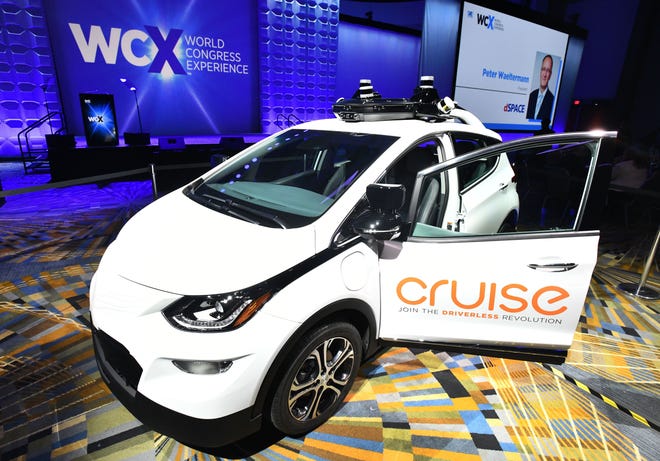GM's driverless car petition to NHTSA enters public comment phase

The National Highway Traffic Safety Administration is taking action on General Motors Co.'s request to put a driverless car — without a steering wheel or pedals — on public roads, advancing the Detroit automaker's petition to the public review stage.
Publicly airing the petitions of GM and Nuro Inc., a Silicon Valley robotics company, is a required step for using public roads to test vehicles that don't comply with existing federal standards. The petitions will be open for 60 days.
"The Department is actively seeking public comment on proposed exemptions to federal standards and how the public can be protected as new transportation technologies emerge," Secretary of Transportation Elaine L. Chao said in a Friday statement.
NHTSA has provided summaries of GM's and Nuro's petitions for public review. GM submitted its petition to NHTSA in January 2018 in its first step toward deploying a driverless taxi fleet of Chevrolet Bolt EV-based cars, known as the Cruise AV. GM at the time said it would deploy its autonomous fleet this year.
"Safety is the cornerstone of our approach to the design, development and testing of our Zero Emission Autonomous Vehicles," GM said in a statement. "We believe that automated technology has tremendous potential to reduce the human operator error that is a leading cause of more than 90% of vehicle crashes.
"GM’s Zero Emission Autonomous Vehicle (ZEAV) represents important advances in safety, zero emission vehicles, and mobility and meets the safety objectives of all applicable Federal Motor Vehicle Safety Standards (FMVSS).”
In a statement, U.S. Sen. Gary Peters, D-Bloomfield Township, said, "Today's announcement from NHTSA reaffirms that self-driving technologies are not an innovation of the future: they are already on our roads and carrying passengers.
"With self-driving technology rapidly evolving, the federal government needs to put a framework in place that can ensure these vehicles are operating safely without stifling innovation. Today's announcement is an exciting step toward reaching the full promise of self-driving cars to transform mobility and save lives."
GM's 14-month wait for a response from the government regulator is evidence that gaining the necessary federal approval is no small step, nor is it guaranteed. Federal safety regulation language revolves around human drivers and vehicles engineered to be piloted by a human driver — as opposed to artificial intelligence.
GM and Nuro are attempting to prove to the federal government that they can deliver safety equal to what is already required by existing law, and do it without human operators.
If GM doesn't gain federal approval for its autonomous vehicles without a steering wheel, pedals or mirrors by the time its ready to deploy its robotaxi fleet, CEO Mary Barra has said the company could launch the service with the current-generation Cruise AVs already on the road in San Francisco.
Barra and other leaders at the automaker and its autonomous-driving unit, GM Cruise LLC, have said the deployment of the driverless taxi service will be "gated by safety."
nnaughton@detroitnews.com
Twitter: @NoraNaughton